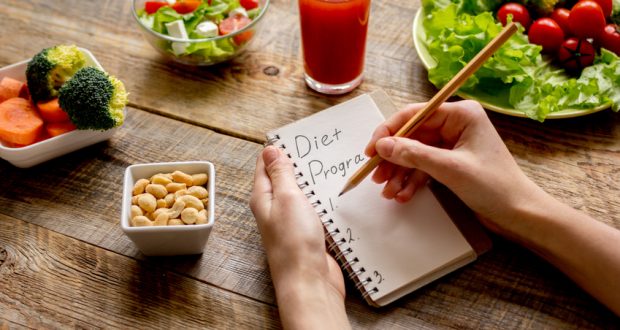Diet is defined by the Oxford Dictionary as “the kinds of food that a person, animal, or community habitually eats.” However, to most people, the word diet refers to a restricting one’s food intake, usually with the goal of weight loss.
Losing some weight can help lower blood sugar levels, as well as reduce risk of complications due to diabetes. However, certain dieting methods can be dangerous for diabetics. It is important to understand the effects dieting can have on blood sugar and overall health.
The first thing to do is to speak with your healthcare team. If you are not currently at a healthy weight, your physician will set a goal weight for you to reach. Check in regularly with your physician regarding your progress to ensure you remain on track.
Don’t fall for fads. While the “lose 20 pounds in a week with the XYZ diet” may sound appealing, don’t trust it. As with most things, if it sounds too good to be true, it probably isn’t true.
The healthiest way to go is to eat right, get moving, and take it slow. While the results may not be immediate, they will be worth it.
Think of this journey as a marathon instead of a sprint. You are more likely to succeed long-term if you start slow. Try adding 15 minutes of physical activity per day, or not indulging in your daily after-dinner treat. Make two new goals per week, meet them, and then build on them.
Keeping a food journal is a great way to hold yourself accountable, as well as to provide yourself with a source of encouragement. You are more likely to make positive food choices if you know that you have to write it down and review it later.
For diabetics, journaling can be especially helpful. Tracking your blood sugar alongside your food and beverage choices can provide some seriously revealing insight. Take your journal to your next check-up and review it with your physician. He or she will be pleasantly surprised at your dedication, and will likely be happier with the numbers you are now producing!
Don’t skip meals. While it may be tempting to cut calories by not eating, this strategy will backfire. When you skip a meal, your blood sugar goes haywire. It can drop to unsafe levels; you will notice that you have less energy, and you may develop a headache, or stomachache.
When you finally do eat something, you are likely to over-eat (thereby consuming more calories than you would if you had eaten two regular meals), or make a less-than-ideal food choice because you are so hungry. Not to mention, your blood sugar will skyrocket because it is getting stimulated all at once instead of over the span of an entire day.
Eat regularly to make sure that your body is getting the fuel it needs. For some, this means 3 larger meals and 2 snacks, for others it may mean eating every 2-3 hours. Find what works best for your blood sugar. Don’t forget to drink plenty of water, as well. This not only keeps your metabolism running at top speed, but also helps you feel full.
The first meal of the day has an especially strong impact on your metabolism and blood sugar. Eating within 2 hours of waking helps set the stage for stable blood sugar all day. To help curb evening snacking, try closing down the kitchen after dinner so you don’t eat more before bed.
All of your meals and snacks should contain a balance of protein, good fats, and fiber. Try planning your meals to help you make smarter food choices, and save some money!
Stress has an incredible impact on diet and on diabetes. When you are stressed, you are more likely to make quick and easy food choices that may not be the healthiest. Or you may feel the need to eat for comfort… mashed potatoes or mac n’ cheese, anyone?
There are plenty of ways to keep your stress levels down, and your diet on track. Learn more about how stress affects blood sugar, and ways to reduce your stress levels here.
Don’t go it alone! Identify the supportive individuals in your life. Tell them about your goals and ask them to keep you accountable and motivated as you work toward those goals. This group could consist of family members, friends, coworkers, or online support circles.
Diet doesn’t have to be an evil word. It should represent the combination of healthy choices we make regarding the foods we eat. It is possible for diabetics to diet safely and effectively; a great healthcare team, access to good information, personal dedication, and a healthy dose of support are what it takes!
Sources: http://www.webmd.com/diabetes/features/diabetes-dieting-dos-and-donts#1
 Diabetic Kitchen
Diabetic Kitchen





Thanks for sharing valuable information..i like your article..for good diabetic health use diabetes good health supplements..To know more about that visit on holyland HYPERLINK “https://hl12.review/” health’s HL12